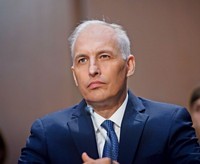Advertisement
Grab your lab coat. Let's get started
Welcome!
Welcome!
Create an account below to get 6 C&EN articles per month, receive newsletters and more - all free.
It seems this is your first time logging in online. Please enter the following information to continue.
As an ACS member you automatically get access to this site. All we need is few more details to create your reading experience.
Not you? Sign in with a different account.
Not you? Sign in with a different account.
ERROR 1
ERROR 1
ERROR 2
ERROR 2
ERROR 2
ERROR 2
ERROR 2
Password and Confirm password must match.
If you have an ACS member number, please enter it here so we can link this account to your membership. (optional)
ERROR 2
ACS values your privacy. By submitting your information, you are gaining access to C&EN and subscribing to our weekly newsletter. We use the information you provide to make your reading experience better, and we will never sell your data to third party members.
Research Funding
Reactions
November 9, 2019
| A version of this story appeared in
Volume 97, Issue 44
Letters to the editor
Free academic exchange
We would like to expand on “Amid Tensions with China, US Emphasizes Research Security Rules” (C&EN, Sept. 30, page 36), as this topic is relevant to chemists.
Ethnic profiling of Chinese scientists in the US was a subject of the National Civic Leadership Forum Sept. 15–18, a nonpartisan event for the Asian American and Pacific Islander community. There have been about 240 prosecutions and over 1,000 investigations since the Economic Espionage Act (EEA) was enacted in 1996.
Findings show that people with Asian names are indicted more, dismissed more, and when convicted, punished about twice as severely in EEA cases (see “Prosecuting Chinese ‘Spies’: An Empirical Analysis of the Economic Espionage Act,” Cardoza Law Review, 2018). Scientists wrongfully accused of espionage can have their reputations, families, and careers ruined. Here, we come to the defense of Chinese American scientists and call for a better balance of security, but not at the expense of civil liberties.
US universities encouraged exchanges and collaborations with Chinese universities until a few years ago. Currently, they are not encouraged and in some cases deemed criminal. Ethnic profiling is not only illegal but also counterproductive. Free academic exchange between scientists in the US and China is crucial for discoveries to be made that will in turn benefit the US.
This pattern of targeting Chinese scientists is not new. Cases include those of Wen Ho Lee, Sherry Chen, Xiaoxing Xi, and Franklin Tao. Ethnic Chinese scientists have been terminated or forced to resign or retire from MD Anderson Cancer Center and Emory University.
On Sept. 10, we at the Committee of Concerned Scientists posted “Should the United States Hide Its Cancer Research from China?” We explain that “the idea that science innovations flow one way from the U.S. to China, promulgated in some circles of the U.S. government, is completely outdated. It has led to human rights abuses and is negatively affecting U.S. universities and research centers.” We indicate that the US government should recognize that China is a major source of science innovations and a force in research.
Chemists should speak up on countering ethnic profiling and unwarranted investigations of Chinese scientists in the US. Such actions by our government should cease. These issues facing ethnic Chinese scientists in the US are in need of vocal condemnation, as they often lack due process. It is important that chemists become involved in this civic engagement.
Alexander Greer and Eugene Chudnovsky
New York City




Join the conversation
Contact the reporter
Submit a Letter to the Editor for publication
Engage with us on Twitter